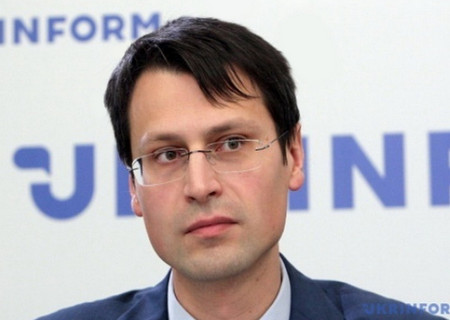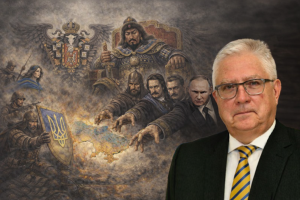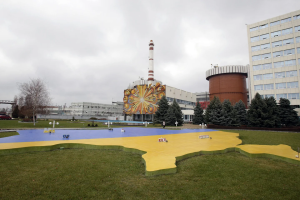The collapse of the Russian Federation and the victory of Ukraine: What the West fears and what it wants to control
Source: NV
Why the West thinks that Ukraine’s victory needs to be restrained
When the West talks about the defeat of Russia, they do not mean Russia falling apart. Only a few say that a possible option for the defeat of Russia is its disintegration. And here people lack imagination. When thinking about the future, everyone goes back to the past, and based on that, they think about what the future could be like.
Russia was twice on the verge of certain defeat or certain changes. The first time was in 1917. Russia did not lose in the First World War. It's just that during the war, a revolution took place in the Russian Empire. The system changed from a monarchy to a republic. The second such situation arose during the collapse of the USSR. And that is why the West believes that when Russia is defeated, its disintegration will begin. And they fear this disintegration. In 1917, there were no nuclear weapons, and in 1991, the Americans managed to agree with the leadership of Russia on an organized process of denuclearization of small states. — that Ukraine, Belarus, and Kazakhstan would voluntarily give up their nuclear weapons and that these three states would renounce their nuclear status.
Again, this is why they don’t accept theses about the defeat of Russia – because they fear not so much Russia’s disintegration, but what will become of its nuclear weapons, where they will end up, and in whose hands.
A little background.
In the late 1980s and early 1990s, the American nightmare was that nuclear weapons would fall into the hands of what they believed to be nationalist politicians in Ukraine or Kazakhstan. Or that these nuclear weapons, left unprotected, would be sold on the black market and fall into the hands of terrorists. And they are also now afraid that if any disintegration processes begin in Russia, control over nuclear weapons will be lost.
In order for this not to happen, Russian disintegration must be prevented. If this cannot be allowed, but Ukraine's victory could lead to it, then Ukraine's victory must also be restrained. And it is not Ukraine that should dictate the terms of peace for Russia, but rather Ukraine should accept the terms that will be dictated by the USA and other Western states. This is roughly how they think in the West. We understand this very well, and we are trying to counteract it.
Despite the genocide in Chechnya, the attack on Georgia, and the invasion of Ukraine in 2014, Putin has continued to shake hands with the West, continued to negotiate contracts, and continued to have weapons and dualuse goods sold to his country by Germany and France between 2014 and 2021.
The conclusion is as follows: economic interests always come first, and there is nothing surprising in this. The West trades with China. The U.S. trades with China. China is their largest trading partner, despite the risk of a serious conflict should China attack Taiwan. We just have to understand it – money, issues of trade, investment, global division of labor, who produces what – all this has much more value in the eyes of Western elites than issues of freedom and democracy. This, unfortunately, is just how it is.
But we can also play to this mindset. We can explain a very simple thing: since Russia violates international law, accordingly, no contracts can be concluded with it, because it will violate all of them equally. Russia was one of the strongest suppliers of oil and gas, and it also supplies food to foreign markets. They have used all three of these critical goods for political purposes, as weapons, trying to wield them to punish enemies or reward allies.
This is what we see in the case of Hungary or Austria with the supply of oil and gas. If a counterparty cannot be trusted, then how can you build a relationship with them? You have to find someone else. Second, we once again show, through the example of our war with Russia, that democracies must stick together and oppose autocracies in a joint front. Because autocratic regimes are asleep and see the subjugation of democracies, first of all, of their neighbors. They see the world as dictated by the will of powerful states. In view of this, the position of Germany, which says that it is necessary to avoid dividing the world into democracies and autocracies, seems very short-sighted. This is what German Chancellor Olaf Scholz stated in an article for Foreign Affairs.
This is a serious challenge for us, because this view entails that a common language must be found with Russia. Our position, on the other hand, is that there cannot be any common language. There must be a struggle to the end, until the fall of the autocratic regime in Russia. If Russia disintegrates, there is nothing terrible about it: if one autocratic state is replaced by several democratic ones. And we can contribute to this.
I am asked, where does this conviction come from that Russia will break up into democratic states?
I agree that this is a big question. No one knows this. My point of view is that there will not be a collapse of states, but that a revolution may happen. This has always happened in the history of Russia. It did not fall apart, but rather experienced a revolution, or some kind of uprising, where the poor people rose up against the ruling classes. This has been repeated from century to century. Only in the 20th century was this rebellion successful, hence why it was called a revolution. In the USSR in 1991, there was also an uprising of the masses against the ruling corrupt elites, and it was also successful.
So, if anything successful can be expected in Russia, it will only be when average citizens, the disadvantaged, and the poor classes rise up against the elite who have extorted the country for the past 30 years. But there will be no disintegration into national minorities or national states. Only a civil war can start in Russia – between the poor and the rich.









